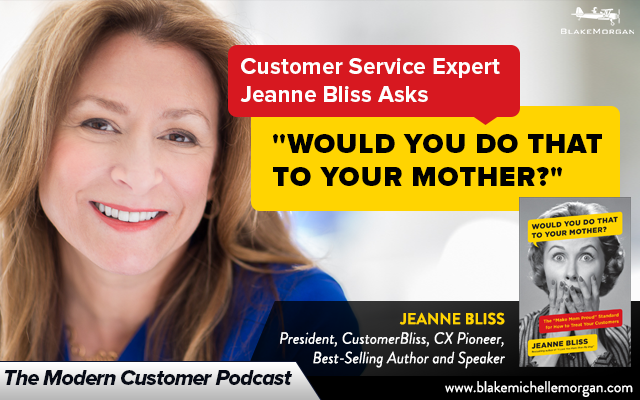Business leaders, contact center employees and sales associates interact with customers every day and are faced with requests, questions and a wide variety of complaints and issues. The customer experience largely comes down to how they respond—is it with a rote reply or a personalized reaction?
Jeanne Bliss, president of CustomerBliss, bestselling author and a pioneer in the CX field, wants leaders and employees to pause before responding and remember the human side of customer interactions. Her new book asks the question, “Would you do that to your mother?”
The idea is simple—we take good care of the people we care about, whether it’s our mother, sibling or a close friend. In many situations, there is a difference in how we treat customers and how we treat our loved ones. But every customer we interact with is someone’s mother, sibling or friend and should be treated with the same humanity and respect.
Bliss says the work of customer experience can get unnecessarily complicated. By pausing and evaluating the situation before taking action, practitioners can connect in a more human way instead of being stuck in a sea of processes and regulations. After all, customer experience comes down to connecting with people, not just sticking to a rule book.
An example Bliss cites in her book is Vail Resorts, which outlawed phrases like “Our policy is”, “Not my job” and “I don’t know.” The company gave its employees freedom to deliver the experience of a lifetime to its customers and provided the training and trust to go along with it.
If your mother called in with a warrantee claim three days after the warrantee expired, you wouldn’t give her a lesson in your company’s warrantee policy—you would simply take the claim and make an exception. The same should be true with other customers. If a long-standing customer calls with a warrantee claim just after the warrantee expires, take care of them like you would your mother. If not, you put that customer relationship at risk and open the door for them to go to a competitor.
One of the reasons people often overlook the humanity of customer experience is that there is a lack of trust in many organizations. When leaders don’t trust employees, it leads to a poor experience that drives away employees and customers. We should trust employees and trust customers, just like we trust our mothers and other loved ones.
Bliss also shares the example of Cleveland Clinic, which realized more than a decade ago that it just wasn’t pleasing customers. The organization implemented rules that meant that no employee, no matter if they were a doctor or worked in the gift shop, was allowed to pass a customer requesting help. It also made all employees caregivers and gave them training and permission to stop and help every customer and patient they saw. The company got rid of silos for a more holistic approach to customer experience. You wouldn’t leave your mother in the hallway of a hospital, so why would you do that to a customer?
Customer experience is all about humanity. More than profits or growth, it really comes down to connecting with customers and meeting their needs. As we build and strengthen relationships, the growth and profits come naturally. As Bliss says, we need to add humanity to customer experience and really ask ourselves, “Would I do that to my mother?”
Blake Morgan is a customer experience futurist, keynote speaker and author of “More Is More.” Sign up for her weekly newsletter here.

